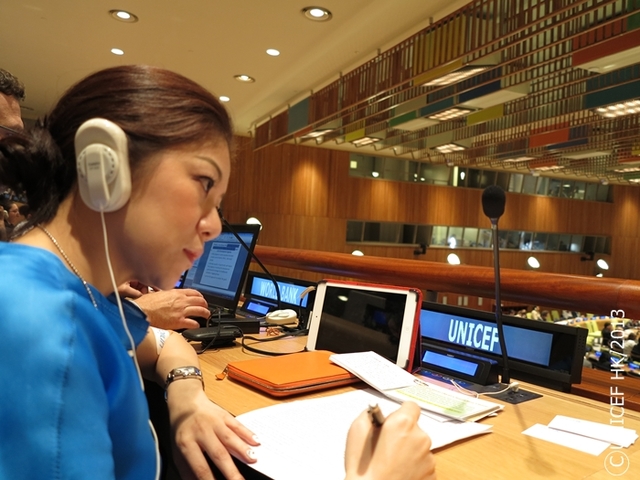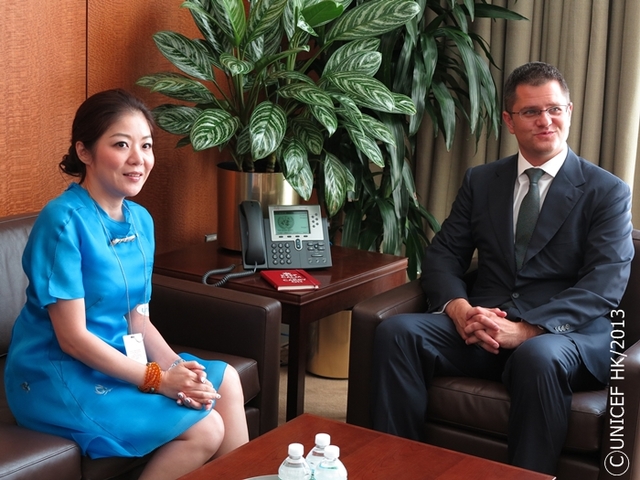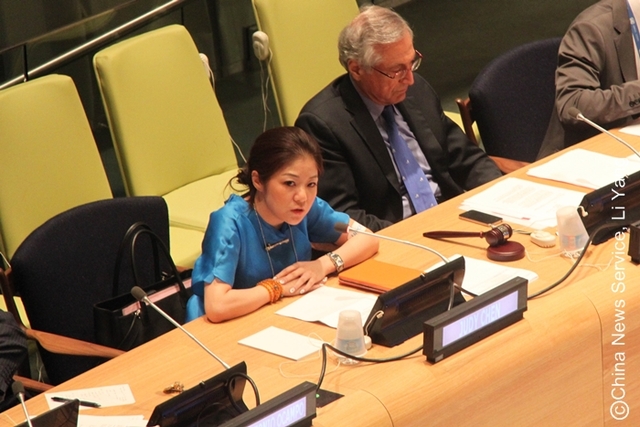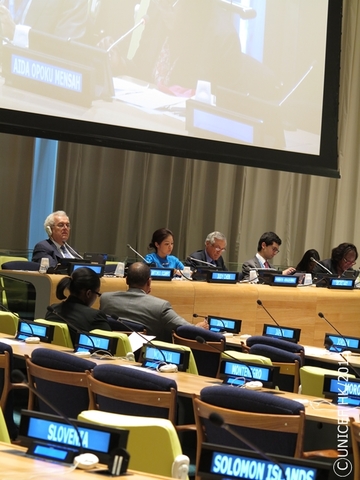UNICEF HK Chairman Ms Judy Chen calls for “Reducing inequalities, starting with children” in the UN Thematic Debate on Inequality
2013-07-18
NEW YORK/ HONG KONG, 18 July 2013 — The United Nations (UN) General Assembly has organised a thematic debate on Inequality last Monday, calling out to the international society to tackle social and economic inequalities between regions and within countries. Ms Judy Chen, Chairman of the Hong Kong Committee for UNICEF (UNICEF HK), is the first non-government official representative from China and Hong Kong being invited to deliver a speech in a thematic debate at the UN General Assembly. She proposed to reduce inequalities starting with children, and emphasised gender, race, social and health status are only factors that nurture children’s diverse experience in lives, but not “excuses” for unfair childhoods.
The thematic debate was held last Monday, 8 July 2013, at the United Nations Headquarters in New York, where delegates from various countries and UN organisations were invited to attend. Mr Anthony Lake, UNICEF Executive Director and Ms Judy Chen, UNICEF HK Chairman were both invited to attend the debate where Mr Ban Ki-moon, Secretary-General of United Nations made opening remarks.
After the Assembly, Ms Chen met Mr Lake and Mr Vuk Jeremic, President of the UN General Assembly respectively and further exchanged views on reducing social inequality, and helping women and children walk out of suffering.
 In the opening speech, Mr Ban Ki-moon, Secretary-General of United Nations said equity is emerging as a central plank in discussions on the post-2015 development agenda, and transformative change are needed in reducing inequality. “Social and economic inequalities can tear the social faic, undermine social cohesion and prevent nations from thriving. Inequality can eed crime, disease and environmental degradation and hamper economic growth.” He called on all countries for greater efforts to eradicate extreme poverty and hunger, and more investment in health, education, social protection and decent jobs, especially for young people.
In the opening speech, Mr Ban Ki-moon, Secretary-General of United Nations said equity is emerging as a central plank in discussions on the post-2015 development agenda, and transformative change are needed in reducing inequality. “Social and economic inequalities can tear the social faic, undermine social cohesion and prevent nations from thriving. Inequality can eed crime, disease and environmental degradation and hamper economic growth.” He called on all countries for greater efforts to eradicate extreme poverty and hunger, and more investment in health, education, social protection and decent jobs, especially for young people.
UNICEF HK Chairman Judy Chen delivered a 10-minute speech, explaining the reasons and phenomenon of global inequality, and the state and problems faced by world’s children. She cited the conflict in Syria as an example, where many children were used as ‘human shields’, and up to now over 1,700 children under the age of 10 has died.
 Ms Chen also ought the problem of left-behind children in China to the UN, and mentioned an estimated 100 million children were left-behind in rural areas. She said that parents work in the city most of the time, and leave their children behind in their hometown. These children lack fundamental medical and education opportunities, and fall into the vicious cycle of poverty and the lack of knowledge. To tackle this, UNICEF has joined hands with local partners to establish Child Friendly Spaces, to provide left-behind children with services such as basic health care, education and family support etc. “Every child is equal. Their gender, race, social and health status, and their norms, economy and development of the place they are residing should nurture their diverse experience in lives, instead of being their cause to unfair childhood.” She added, “If we continue to turn a blind eye to the inequalities and unfortunate among them, we will just see hundreds and thousands more children, with resentment and despair in their eyes. How could we fail them?”
Ms Chen also ought the problem of left-behind children in China to the UN, and mentioned an estimated 100 million children were left-behind in rural areas. She said that parents work in the city most of the time, and leave their children behind in their hometown. These children lack fundamental medical and education opportunities, and fall into the vicious cycle of poverty and the lack of knowledge. To tackle this, UNICEF has joined hands with local partners to establish Child Friendly Spaces, to provide left-behind children with services such as basic health care, education and family support etc. “Every child is equal. Their gender, race, social and health status, and their norms, economy and development of the place they are residing should nurture their diverse experience in lives, instead of being their cause to unfair childhood.” She added, “If we continue to turn a blind eye to the inequalities and unfortunate among them, we will just see hundreds and thousands more children, with resentment and despair in their eyes. How could we fail them?”
 Even the situation in Hong Kong is not as severe as seen in the above countries, Ms Chen noted the new immigrant or ethnic minority children in Hong Kong face the same neglect from the society. “Sometimes they may not even have the chance to develop what they are good at. Although Hong Kong is regarded as a relatively developed region, the wealth gap has limited many opportunities for children to learn. Right now, UNICEF HK is striving hard to solve this problem.”
Even the situation in Hong Kong is not as severe as seen in the above countries, Ms Chen noted the new immigrant or ethnic minority children in Hong Kong face the same neglect from the society. “Sometimes they may not even have the chance to develop what they are good at. Although Hong Kong is regarded as a relatively developed region, the wealth gap has limited many opportunities for children to learn. Right now, UNICEF HK is striving hard to solve this problem.”
During the Assembly, Ms Chen introduced a series of activities initiated or supported by UNICEF HK to realise children’s right to participation by providing Hong Kong children opportunities to be heard by the society and government, and give comments on social inequality through different channels. She mentioned the ‘Voices of Youth’ radio programme launched in 2010, which enables children to spread the voices of children and youth to society; the ‘Children’s Council’ organised and sponsored by the Hong Kong Government, where children can discuss motions relating to children by becoming Child Councillors.
 “I am a mother; I am also a part of UNICEF. In UNICEF, ‘Unite for children’ is our motto.” Ms Chen then called out to the leaders of other countries, “For our future, for our children, please act on reducing inequality starting from children.”
“I am a mother; I am also a part of UNICEF. In UNICEF, ‘Unite for children’ is our motto.” Ms Chen then called out to the leaders of other countries, “For our future, for our children, please act on reducing inequality starting from children.”
Mr Anthony Lake, UNICEF Executive Director, stated during the Assembly that social development was extremely uneven, and the development pace for women and children was greatly behind. “In any case, by definition, without addressing the plight of the most disadvantaged, we cannot eradicate extreme poverty.” He also pointed out the importance of reducing social inequality to achieve Millennium Development Goals(MDGs), “Nor can we succeed in our goals of eradicate polio; of greatly reducing under-five mortality; of increasing access to healthcare, education, nutrition, or clean water and sanitation, if we don’t concentrate on the areas where disease, literacy and deprivation of all kinds have their tightest grip.”
The MDGs – a series of time-bound targets with a deadline of 2015 – was set in the Millennium Summit at United Nations held in September 2000. The eight goals include halve the extreme poverty, combating HIV/AIDS, achieving universal primary education, promoting gender equality and ensuring environmental sustainability, etc.
- END -









